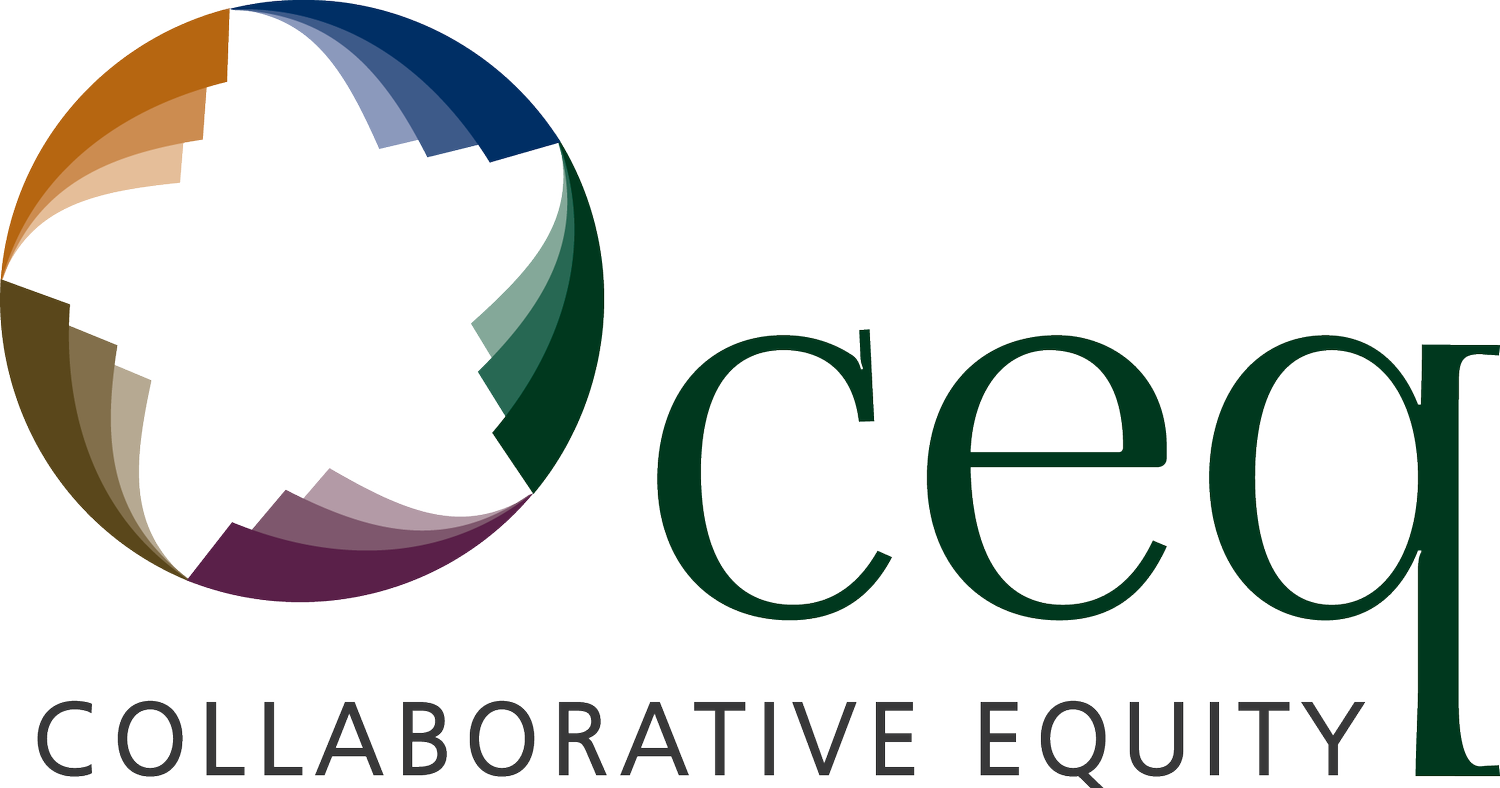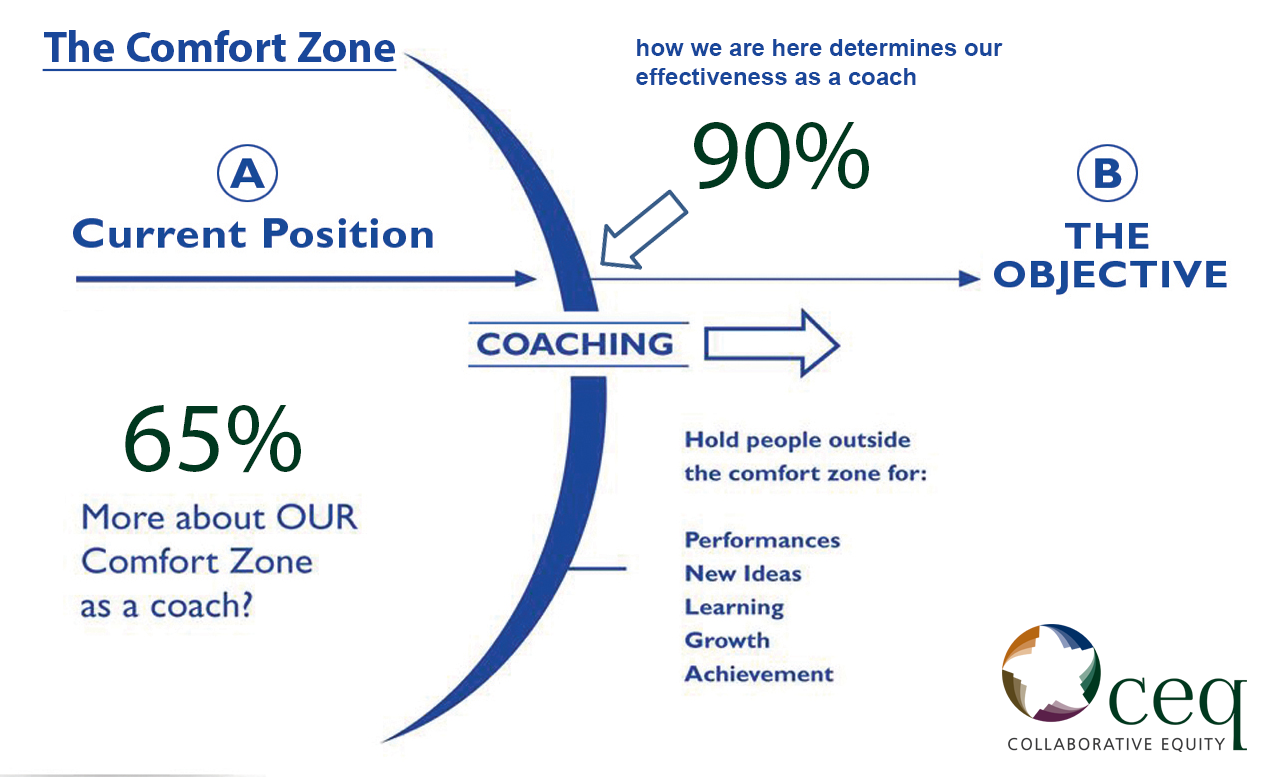The Comfort Zone
/If someone comes to you as their Boss, Manager, Leader, Coach and asks for help or guidance, it is because that’s what they need. They do not need to be told what to do, or precisely what solution to execute and precisely how to execute it (although they may present in that way). So the ‘Let me tell you what you need to do…….’ approach, whilst something of a natural habit in us problem solvers and puzzle breakers, is not appropriate.
They’re at the edge of their comfort zone. They’ve thought of and tried all the obvious stuff. They’re bright. They know that whatever they do next will involve them in stepping outside their comfort zone.
A Coach takes a person outside their Comfort Zone, and holds them there while they learn and grow
The coaching comfort zone. COPYRIGHT Collaborative Equity LLP
Here’s another way of looking at the comfort zone. We are at position A, aiming for our target at position B. Have you noticed that your company only ever sets you objectives that can only be achieved by you performing to extraordinary standards and methods? So somewhere along the path we hit the edge of our Comfort Zone and then we have a choice. What typically happens is that we decide not to go outside, and therefore we have to give up on achieving the target B. But if we give up on the target, we need have a story that excuses us. So we come up with reasons why we cannot achieve B, and since we are now turning all our energy and creativity into these reasons, they are always ‘perfect’ and thus cannot be denied or countered.
If B is a sales target, our ‘perfect’ reason may be that B was always unrealistic, but we all knew that and where we will actually end up will still be a good result. If B is a customer order, our ‘perfect’ reason may be that our competition has done something underhand or uncommercial to win the business that we of course, on our high ground, would not stoop to. If B is the development of a person under our leadership, our ‘perfect’ reason may be that something they did along the way caused us to determine that they clearly need another 12 months experience before we can promote them. If B is a market share position, our ‘perfect’ reason could include any one of a multitude of external events that were both completely unpredictable and outside our control.
The most powerful ‘perfect’ reason to brandish is one where the boss is actually included. So maybe the reason I did not meet my commitment to get that piece of work to you, is because you asked me to go to see that customer last week. In other words you changed my schedule, thus clearly making me miss the deadline. Of course I did not tell you when you diverted me last week that asking me to do something extra would cause me to break my commitment.
How often have we gone to hold someone to account for not completing on a commitment they have made, thinking to ourselves ‘this had better be good…..’, only to reluctantly let the other person off the hook because their excuse is so plausible, and only because it would SO unreasonable of us to insist that they should still have met their commitment.
We are experts at perfect reasons (excuses). They always mask a fear – fear of failure, fear of taking the necessary risks, and the most powerful fear of all – fear of the judgments people will make about us should we fail.
A good coach will listen for these and then move the person outside their comfort zone again by challenging.
But how do we hold people outside their Comfort Zones? It’s up to us to determine what tool to use to get them outside their Comfort Zone – from gentle persuasion and encouragement at one extreme, to a kick up the backside at the other.
But then we need to hold them outside so that they experience what it’s like. For only outside the comfort zone will people perform at a higher level, learn from new experiences, grow and most importantly, achieve things they had begun to believe were not possible, or perhaps had never dared to believe were possible.
People gain enormous confidence from achieving things. It’s infectious and it gives a huge positive momentum. This is the starting point for bringing out the true untapped potential of our people.
If I were to ask you to tell me a story of something you achieved in the past, of which you were incredibly proud, you would tell me a story of how you had come out of your Comfort Zone. After all why on earth would we be proud of something that had been easy for us? And the pride that comes, gives us a taste of achievement. And achievement builds tremendous confidence. So the time to really challenge people is often immediately after they have achieved something extraordinary.
And going back to our conscious focus, the reality is that if as leaders, we make the experience of being outside their Comfort Zone one of fear, then the things people will consciously focus on will be defensive, and safety based. They will do everything in their power to get back inside their comfort zone, including lying and blaming others. If however we make that experience exciting, then the things they will consciously focus on will be expansive, creative and energetic, and the transformation in that moment will be palpable and beautiful. More than that, they will want that experience again for it is a more deeply rewarding experience than following orders.
A Coach takes a person outside their Comfort Zone, and holds them there while they learn and grow, however uncomfortable this might be for the Coach. The trick is to make the person feel safe and uncomfortable at the same time.
A Leader takes an entire community outside its collective Comfort Zone, and makes the journey exciting, not frightening.
Make people feel valued and supported when they are outside their comfort zone, not judged and fearful
And so it dawns on us – this coaching lark is more about our comfort zones than others. Are we prepared to risk being judged as unreasonable? Are we prepared to go outside our comfort zone and meet our own fear of the judgment of others head on?
This is where leaders really come into their own – as coaches and facilitators. The leader needs simply to walk with the other person as they go outside their comfort zone, then hold their hand as they learn and grow while they are out there, then help them reflect on the experience. ‘Walking with them’ might mean pushing them, maybe even forcing them out of their Comfort Zone; ‘Holding their hand’ might mean barring them from retreating back into their Comfort Zone once they are out there; ‘Helping them reflect’ might mean pushing them to commit to an action or decision – notice these are not passive roles. Being in relationship with someone as they go outside their comfort zone will by definition make you also feel uncomfortable. But this is where the work is really done. This is where progress is made. This is where learning and growth are sourced. And this is where our most profound partnerships and relationships of trust are forged.
Article excerpted from “And the Leader Is…Transforming Cultures with CEQ” - by Gareth Chick
About the Author:
Gareth Chick is a 40 year corporate veteran with a global profile. His career has included hugely successful spells as CFO, CEO and Chairman in both public and private sectors, including private equity. What makes Gareth's experience unique is that he combined those executive roles with a part time career as a leadership trainer, researching psychology, neuroscience and psychotherapy to create leadership development programmes used now by many major global corporations. In the last 15 years Gareth has trained over 5000 managers and served as Executive Coach to over 200 senior execs including FTSE100 CEOs and Fortune 500 VPs. As Founder of Collaborative Equity LLP, “promoting corporate cultures and sustainable business models of shared ownership, shared responsibility and shared rewards", Gareth acts as consultant to many global leaders, specialising in first time CEOs and Start Up founders. ↠ find out more at ceq.com
Recommended Article - Human Potential
Recommended Article - Untapped Potential
Recommended Article - Directing and Coaching




